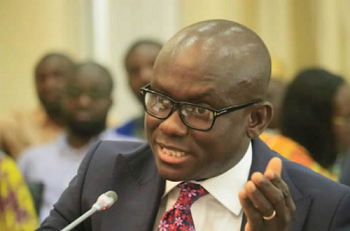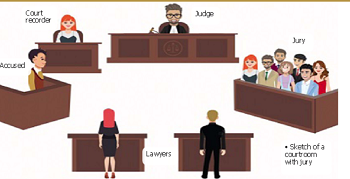
Ghana’s jury system reform: Prioritising jury sequestration key to balancing wheels of justice
Expression of reservations by a section of the public on social media characterised the verdict delivered by the seven-member jury that determined the fate of the two persons that stood trial for the murder of Adams Mahama, a former Upper East Regional Chairman of the New Patriotic Party (NPP).
Advertisement
Right from the courtroom, some lawyers asked myriad questions about what could have led to the final verdict, which unanimously found Asabke Alangdi of guilty on the charge of conspiring with Gregory Afoko to kill Mahama in 2015, but returned a verdict of 4:3 of not guilty on the charges of conspiracy to commit murder and murder for Afoko.
The two had been charged with conspiracy to commit murder, and murder. By a decision of 4:3, the accused persons are not guilty of the offence of murder. By a unanimous decision, Alangdi, was guilty of the offence of conspiracy to commit murder.
In accordance with section 285(1) of the Criminal and Other Offences (Procedure) Act, 1960 (Act 30), Justice Merley Afua Wood, a Justice of the Court of Appeal sitting as an additional High Court judge, proceeded to pass the mandatory sentence of death on the Asabke Alangdi.
By a decision of 4:3, Gregory Afoko, was not guilty of the offence of conspiracy to commit murder.
It was the lack of unanimity in the verdict of the jury regarding the offence of murder for which both accused persons stood trial, and the offence of conspiracy to commit murder in the case of Gregory Afoko, who is to stand trial again, that raised eye brows about the verdict.
Verdict
Describing the verdict of the jury as “strange” and a travesty of justice, Counsel for Alangdi, Andrew Vortia, vowed to appeal the death sentence of his client.
He wondered how the jury could have found Alangdi guilty of conspiracy to commit murder and then found Afoko not guilty of the same charge of conspiracy.
“How can a person conspire against himself? In law, conspiracy only holds against two or more people, and each of the accused persons must be guilty. Who did my client conspire with if the first accused person has been found not guilty by the jurors on the same facts?
“There is no way one person can be found guilty of conspiracy and the other party will not be guilty. I am, therefore, going to lodge an instant appeal,” Mr Vortia said.
According to him, the case was a clear testament that the jury system in the country was defective and should be scrapped.
A Facebook user, Nhyira Kwame, who commented under Daily Graphic’s posted story asked, “”You alleged they have both conspired but one is found guilty and the other is not. So he conspired against himself?”
Another user, Atubila David wrote, “I can’t think far. How can a person conspire against himself?” and another user, Isreal O. Abafum replied, “Exactly what I don’t understand”.
Jury system in Ghana

In Ghana, a jury is made up of seven ordinary, but educated persons who, subject to the directions of the judge, decide the guilt or innocence of an accused in a case tried upon indictment.
Before the main trial in the High Court, the accused are first tried in a District Court, where the sole purpose of that trial is to determine if there is any evidence at all against the accused.
If there is such evidence (which is called a prima facie case), the magistrate (judge of a District Court) makes a decision that the accused be taken to the High Court to stand the main trial, where at the end a decision will be made that the accused is innocent or guilty.
The trial in the District Court is called committal proceedings.
This comes after the Attorney-General (AG) writes and files in the Court, an allegation of the crime, called a bill of indictment. It serves as the charge sheet of the case.
The bill of indictment basically contains the following on the accused: name of the accused, his crime and charges, summary of evidence to be given, by whom and the exhibits to be used at the trial.
If the magistrate commits the accused, the court’s file (also called docket) containing the bill, the decision of the court, the exhibits, etc., are forwarded to the High Court for the main trial.
Trial
In the High Court (main trial), after the accused pleads not guilty, the jurors are selected in the following manner: the names of the prospective jurors are placed in a ballot box and seven names are drawn in the presence of the accused, who has a right to object to three selected jurors without giving a reason.
Beyond the three jurors, the accused can object to any other prospective juror and state a reason for the objection. If the prosecution disagrees with the reason assigned, the judge shall decide that matter but before the decision, the judge shall take evidence on it.
When the seven are empaneled, they are sworn in and they choose one of their own as a leader (foreman).
When a jury is absent, the trial does not take place. Additionally, if a juror becomes seriously ill or passes away, the panel has to be reconstituted for the case to commence from scratch.
At the end of the trial, the judge guides the jurors (with law and the evidence adduced) on how to come to a decision (called summing up). The jury then retires into chambers (jury room equivalent to a judge’s chamber) and comes back to give its verdict, which must be unanimous in the case of murder, but for some other offences, a majority verdict is accepted.
Challenges
A juror must be given an honorarium for each sitting. However, there are usually delays in the payment among other challenges.
Since the verdict was delivered, the Attorney-General and Minister of Justice, Godfred Yeboah Dame, said the case highlights severe challenges with the country’s jury system.
These challenges confronting the jury system, according to the Attorney-General were being addressed as steps were underway to remedy them as part of proposals for the amendment of parts of the criminal procedure laws of Ghana.
This is not the first time stakeholders in the justice delivery system have called for a review of jury trial.
Justice Dominic Dennis Adjei, who is a Justice of the Court of Appeal, the number of jurors should be increased from seven to 12 so that a decision can be made by a majority of them.
Ahumah Ocansey, also a legal practitioner, while advocating for a bench trial called for the abolition of jury trials. He said when a judge is sitting alone, he applies knowledge of the law to arrive at a decision.
Sequestration
Beyond these perspectives, another fresh concept introduced into the discussions for reforms, particularly, within the context of this case is jury sequestration
Jury sequestration is where a judge isolates jurors from the public to ensure that they are not exposed to outside influence for an objective verdict.
In such instances, jurors are usually housed at a hotel, where they are not allowed to read the newspaper, watch television, or access the internet, and may have only limited contact with others, and among each other.
Although not common due to its expensive nature, this practice has been applied in some cases in other jurisdictions.
For instance, in the case of the State of Florida v. George Zimmerman, Judge Nelson sequestered the jury in the second-degree murder case.
To conclude, a juror’s objective view about a case is crucial at arriving at a verdict and any potential impediment to his/her decision must be prevented irrespective of the cost involved, to ensure that the wheels of justice are evenly balanced.
Writer’s E-mail: [email protected]




